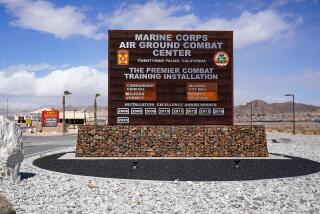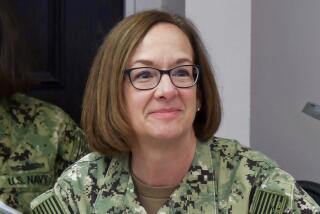Navy’s Top Admiral Dies in Apparent Suicide Shooting
WASHINGTON — The Navy’s top admiral died in an apparent suicide Thursday just before a newsmagazine was preparing to question him about whether he was wearing a combat decoration to which he was not entitled, Pentagon officials said.
Chief of Naval Operations Jeremy Michael Boorda apparently shot himself in the chest at his home at the Washington Navy Yard, using a .38-caliber pistol that belongs to his son-in-law, according to Pentagon officials. He was pronounced dead on arrival at District of Columbia General Hospital.
Navy officials said Thursday that they still were not certain that the admiral’s death was related to the medals issue.
However, the Washington Post, in its editions today, quotes law enforcement officials in Washington as saying that Boorda had left two suicide notes, one to his wife and another to sailors in the Navy in which he acknowledged he made a mistake in wearing a Combat V on his decorations, normally awarded for service in combat. He had wrongly thought he was entitled to them, he said, but worried that some would never see his action as an honest mistake.
Boorda, 57, who entered the Navy as a seaman recruit and became the first enlisted man to rise to the post of chief of naval operations, commanded North Atlantic Treaty Organization forces during the early days of U.S. involvement in the Bosnian civil war.
President Clinton, who learned of the tragedy while at a meeting at the White House, reacted visibly when he heard the news. At a news conference later, Clinton praised Boorda for his “extraordinary energy and dedication.”
Navy officials said that Boorda had left the Pentagon for home after learning that Newsweek was working on a story that called into question the admiral’s right to wear a Combat V.
It was not clear what the consequences would have been if Boorda had worn the Combat V improperly. Navy observers said that the outcome would have depended on details of any such indiscretion.
Pentagon officials said that Boorda had worn the Combat V until about a year ago and then took it off, but they were unable to explain the change. They said that the interview initially had been scheduled for 1 p.m. but scheduling problems forced Boorda to postpone it to 2:30 p.m.
Rear Adm. Kendell Pease, who was with Boorda shortly before the shooting, said that when he told Boorda about the subject of the interview, the admiral abruptly announced that he was going home for lunch instead of eating the meal that had been brought to his office.
Newsweek issued a statement late Thursday saying that it was saddened by the tragedy and confirming that it was working on the story. “Obviously, we had not published a story and had not reached any conclusions,” the statement said.
Boorda was said to have told an aide after learning why Newsweek wanted to interview him: “Well, I guess the thing to do is bring them in and tell the truth and we’ll talk about it.”
The shooting is being investigated by the District of Columbia police and the Naval Criminal Investigative Service.
Boorda had been under pressure in recent months, not only as a result of efforts to downsize the Navy but over Navy scandals involving sexual harassment incidents and wrongdoing at the U.S. Naval Academy. He moved quickly to deal with each of them.
Nevertheless, both Pentagon officials and others who had seen or worked with him in recent weeks described the admiral as generally upbeat about the work he was doing. He became chief of naval operations in April 1994.
A gregarious, hard-working man, Boorda was known throughout the fleet both as a skillful commander and as a man who cared about ordinary sailors. He became known around the Navy as “the people’s admiral.”
Defense Secretary William J. Perry, leading a flood of praise that poured in for Boorda from official Washington and naval installations, called Boorda “a sailor’s sailor” who “put the interest of sailors and their families first” throughout his career.
Navy Secretary John H. Dalton told reporters that he had not been aware of any medical condition that might have contributed to Boorda’s desire to take his own life. Close aides to the admiral also were shocked and puzzled by the action.
Navy officials said that the citations accompanying the medals Boorda wore indicated that the decorations in question were awarded in connection with a “combat operation” but they did not specifically authorize him to wear a Combat V on the service ribbon.
However, the officials said, such decorations were awarded during the Vietnam War, at a time when virtually every decoration was given for “combat operations.” They said it was not immediately clear whether Boorda was entitled to wear the Combat V.
The grandson of Ukrainian immigrants, Boorda was born in South Bend, Ind., and grew up in Chicago. He and his wife, Bettie, have four children.
More to Read
Sign up for Essential California
The most important California stories and recommendations in your inbox every morning.
You may occasionally receive promotional content from the Los Angeles Times.










